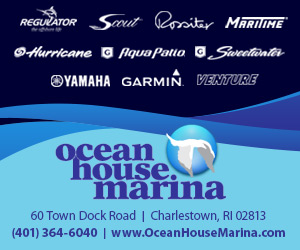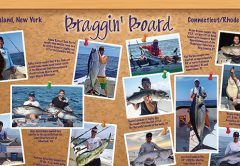By Cynthia Goss
The ocean is not the only place with perfect storms. That rare combination of circumstances that can produce a radical impact can also happen in a workforce. Take the marine trades, for example. The storm has been brewing for a while: the workforce is graying, and not enough young people have been flocking to the marine trades as a career path.
That’s the bad news. But the good news is twofold: Jobs are opening as workers retire, creating new opportunity; and the Ocean State has the Rhode Island Marine Trades Association (RIMTA) — one of the country’s most progressive trade organizations working in marine trades workforce development.
RIMTA manages grant-funded training programs, coordinates with High Schools and secondary schools on their marine education programs, and does outreach to create more awareness about the Rhode Island marine industry as a career path. As a result, RIMTA is helping to fill a pipeline with qualified workers and, at the same time, helping more individuals with a passion for working around boats to fulfill their dreams.
The Current Demand
Neal Harrell—president of Brooks Marine Group, a management recruiting firm based in Newport (R.I.) has an intimate knowledge of hiring trends in the boating business and works with companies across the country to place executives, managers and skilled tradesmen and women.
“Our workforce is aging — but you get a more accurate picture when you lay that information against what has been happening in our society and educational system in the last 20 to 30 years,” says Harrell.
The oldest Baby Boomers are now reaching retirement age, and there are 75 million of them. Generation X that follows is significantly smaller and these individuals grew up in an educational system that stressed college education for all. High School classes in hands-on skills such as woodworking and auto mechanics have vanished, and the U.S. educational system’s ability to cultivate the individuals whose brilliance is working with their hands has diminished.
In the marine trades, that trend is compounded by the fact that when the boating business took a hit in 2008, many companies kept their senior, skilled workers and laid off younger, less experienced staff. Now that business is improving, marine companies need to reload their workforce; according the Harrell, skilled marine tradesmen and women are in demand right now.
RIMTA is well prepared to help indi- viduals hook into that demand. Work- force Development Coordinator Jen Cornwell came to RIMTA with a wealth of experience—having worked previously with the Workforce Partnership of Greater Rhode Island, charged with partnering with local industry to increase labor and training initiatives, and with Tri-Town Community Action Agency, coordinating youth programming. The marine training programs now available in Rhode Island are suited to all ages — from High School students, to individuals in mid-career looking to turn their passion for being near the water into a new career.
Starting Young
Rhode Island has become a leader in marine trades career tech programs for High School students, thanks in part to two impassioned instructors who helped write a curriculum with the American Boat & Yacht Council (ABYC), which can now be adopted by schools in other states.
Michael Jarret, instructor at Chariho Career and Technical Center, and Chris Bianco, instructor at the Warwick Area Career and Technical Center, both run marine technology programs at their respective schools. These are three-year programs, and students enter in the sophomore year.
Students spend the first 1.5 years getting a broad introduction to the industry through 14 modules in different subject areas. After completing these modules students specialize by doing their own project, such as building a boat or rebuilding an outboard.
A third program at Tiverton High School follows a different curriculum. Students hone their hands-on skills by building sturdy 16-foot wooden skiffs; according to Tiverton instructor Bill Phillips, these flat-bottom boats are perfectly suited to the nearby Sakonnet River and were used in the 1970s and ‘80s for quahogging. Students also learn about the industry through talks with local business owners and field trips.
To extend the opportunities for High School students, Phillips runs a six-week summer program at the school. Cornwell also travels to area High Schools, to help more students learn about marine careers. All three High School instructors may be teaching students valuable hands-on skills. But the real work of these instructors is giving students an introduction to new possibilities for their futures.
“The really exciting part,” says Jarret, “is seeing what students decide to do after the program. Before entering the program, they have no idea of the breadth of the marine-trades umbrella. When they leave the program, many go in a direction they never even knew existed.”
Apprenticing, Rhode Island–Style
This past summer, on a July morning at The Hinckley Company in Portsmouth, eight students age 18-23 huddled into the cockpit of a 24-foot Formula powerboat while Kurt Forsman of the Derema Group walked them through the process of winterizing the boat’s 305-horsepower in-board. Students were so absorbed that at times it was so quiet you could hear a pin drop inside Hinckley’s cavernous Building #5 — except when student questions started to fly, which was often. “Couldn’t you do it this way?” “What would happen if you did that step first?” Some students were two steps ahead of Forsman, and that is what Forsman liked most about this group of students: they were eager to learn.
These students were part of RIMTA’s new Marine Trades Pre-Apprenticeship Program, which launched in July. Students studied full-time for 51⁄2 weeks to prepare for entry-level jobs in the industry. The program was made possible through a Governor’s Workforce Board RI grant for $142,788, part of $1.97 million in Innovative Partnership grants distributed throughout the state. RIMTA spearheaded the development of the program and partnered with local marine companies, which supplied facilities and expertise.
The pre-apprentices completed the 205-hour course and received hands-on instruction in areas such as painting and varnishing, composites, customer service, rigging, fork and travel lift operation, winterizing & commissioning, boat handling,and even job-readiness skills. Thirty days after their graduation, every student had secured full-time, entry-level employment at a Rhode Island marine company.
A marine trades apprenticeship program is the next step for Rhode Island — for those who already have a foundation of skill and want to apprentice with master journeymen. RIMTA is already approved by the Rhode Island State Apprenticeship Council for such a program and is working with local marine companies to put apprentices in place. Although the apprenticeship model is common in the boating business in places such as New Zealand, it is a rarity for the United States.
Trade School for All Ages
Rhode Island is fortunate to have excellent local trade schools with marine programs. The New England Institute of Technology (NEIT) in East Greenwich offers an associate’s degree in its Marine Technology Program, which students can complete in as little as 18 months. Graduates work in areas such as marina/boatyard operations, vessel manufacturing, engine repair, support services for commercial vessels, marine electronics installation, and even retail product sales.
IYRS, with campuses in both Newport and Bristol, has a 21-month certificate program in Boatbuilding & Restoration and 6-month programs in Composites Technology and Marine Systems. The school draws a diverse student body. Not only do students come to IYRS from around the world to train; they also range in age from recent High School grads, who opt for trade school in lieu of college, to those in their 30s, 40s, and 50s looking to change careers.
The MotoRing Technical Training Institute’s Marine Service Technician program is a 30-week course based on the water in East Providence. Students are trained in the maintenance and repair of outboard engines, stern drives, and related marine systems. Graduates have moved onto jobs at area marinas, boat yards, and dealerships. At all these trade schools, students can purse an internship as part of their course to give them some solid work experience.
Your Next Step
If you or a family member dream about working around boats, there are a number of events coming up where you can learn more about marine careers and training opportunities in Rhode Island.
The Providence Boat Show takes place January 31 to February 2. Students from the High School marine career tech programs will be at the show, with some working throughout the event to build a wooden boat. And trade schools such as IYRS and NEIT will also attend.
On Saturday, March 22, RIMTA will host the annual Marine Industry Career Day at the IYRS Newport campus. This free event draws employers looking to connect with individuals interested in working around boats, so it is a great opportunity to meet employers and to learn about the field in special presentations held throughout the day.
For more information on RIMTA’s programs and activities, visit www.rimta.org (where you can find a pre-apprentice- ship program application), or contact Jen Cornwell (jen@rimta.org / 401-396-9619). The next pre-apprenticeship program is slated to start in February 2014; space is limited, so potential students need to start the application process as early in January as possible.
[easy-social-share]











